Posted on Oct 29, 2020 in
COVER STORY
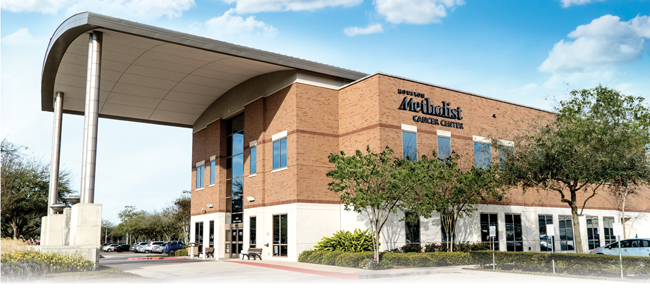
Houston Methodist Cancer Center at Sugar Land, 16675 Southwest Fwy. | Sugar Land, TX 77479
FOCUS COVER STORY
The hospital is safe, and coming in for a screening can save your life.
Cancer has not stopped during the COVID-19 pandemic. But what has come to a stop – almost completely – is regular cancer screening. One study, from the electronic medical records system Epic, found that screening mammograms across the U.S. dropped 94 percent in March when concerns over the spread of COVID-19 intensified.
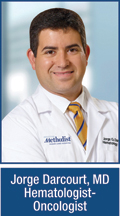 Another study by the IQVIA Institute in April found similar results: since February, colonoscopies were down 90 percent; Pap smears, down 83 percent; PSA testing, used to detect prostate cancer, down 60 percent; and CT scans for lung cancer, down 39 percent.
Another study by the IQVIA Institute in April found similar results: since February, colonoscopies were down 90 percent; Pap smears, down 83 percent; PSA testing, used to detect prostate cancer, down 60 percent; and CT scans for lung cancer, down 39 percent.
“These are very significant numbers because they represent a delay in finding and treating the most common and deadly forms of cancer,” said Jorge Darcourt, M.D., board-certified hematologist-oncologist at Houston Methodist Oncology Partners at Sugar Land. “One of our most powerful tools in the fight against cancer is early detection. We know from experience that the earlier we can identify the presence of a cancerous lesion or tumor, the better success we have in isolating it and treating it. It’s time for patients to resume critical screening that can save lives.”
The Houston Methodist Cancer Center at Sugar Land offers the full range of oncology services – from diagnosis through treatment – at one location. Houston Methodist Sugar Land is Fort Bend County’s only hospital with American College of Surgeons-Commission on Cancer accreditation. The accreditation demonstrates the hospital’s commitment to providing the best cancer care through a vast array of high quality, specialized services – screening, diagnostics, genetic testing, advanced technology, clinical trials and patient support.
Patient Safety is Paramount
Since February, many people have put off annual screenings, such as mammograms due to fear of going to the hospital, or uncertainty about changes in appointment processes. But Houston Methodist Sugar Land has developed key safety protocols that protect patients throughout their screening. Since March, the Houston Methodist Breast Care Center at Sugar Land has performed more than 2,800 mammograms, ensuring the safety of every patient even during the pandemic.
“Getting a mammogram or other test today is no different than it was before, except that we have additional layers of protection and safety,” said Michelle O’Shea, M.D., board-certified breast surgeon at Houston Methodist Breast Surgery Partners at Sugar Land. “There is no reason for patients to worry. If you missed your annual mammogram during the first part of the year, you can feel safe coming in now. The staff continues to put patient safety first, which now includes extra precautions and safety measures.”
The hospital’s focus on safety includes constant deep cleaning and the use of CDC-approved disinfectants – including UV lighting sanitizers – along with the following new safety processes:
- A new in-car check-in process, as well as reconfigured waiting rooms and check-in lines to support social distancing.
- Mandatory masking and social distancing guidelines for all physicians, employees, patients and visitors.
- Screening all patients to ensure those suspected or confirmed to have COVID-19 are scheduled for a later date.
- Daily screening and frequent testing of employees as recommended by the CDC.
- Mandatory personal protective equipment rules for all staff and physicians.
- Additional sanitation processes to disinfect all equipment and surfaces.
Guidelines You Should Know
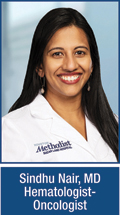 Screening guidelines are based on years of data and are designed to ensure that patients are checked regularly for the most common forms of cancer.
Screening guidelines are based on years of data and are designed to ensure that patients are checked regularly for the most common forms of cancer.
“Following the guidelines is an important step in protecting your health,” said Sindhu Nair, M.D., board-certified hematologist-oncologist at Houston Methodist Oncology Partners at Sugar Land. “It’s important to know your risk factors, such as family history or underlying health conditions, and I recommend that patients talk with their primary care physician about cancer screening as part of their annual check-up. In some cases, it may be beneficial to follow a more frequent screening schedule than is recommended.”
Here are some basic guidelines for the most common forms of cancer screening:
Breast Cancer: Women ages 20-39 should have a clinical breast exam every three years. At the age of 40, women should have both a clinical breast exam and a mammogram annually. High-risk women should utilize additional screening methods at their doctor’s discretion.
“Here at Houston Methodist Sugar Land, we have the latest and most sophisticated imaging technology available, including 3D screening and diagnostic mammography; breast MRI and ultrasound; and biopsies, all read by specialized breast radiologists,” said O’Shea. “That gives us a significant advantage in diagnosing tumors at the very earliest stages, which means that women have the best chance for complete recovery – all at one location close to home.”
To schedule your screening mammogram, visit houstonmethodist.org/imaging or call 281.542.3492.
Cervical Cancer: Women ages 21-29 should have a pelvic exam annually, and a Pap test every three years. Women ages 30-65 should have a pelvic exam annually and a Pap test every three to five years, along with an HPV screen every five years. Women over the age of 65 should have pelvic exams and Pap tests at their doctor’s discretion. To schedule an appointment with Houston Methodist Obstetrics and Gynecology Associates at Sugar Land, call 281.882.3130, or visit houstonmethodist.org/spg to find a doctor near you.
Colon/Rectal Cancer: Men and women younger than age 45 should talk with their doctor about when to begin screening and screening frequency.
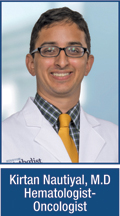 “Your doctor will want to know about high risk factors, such as family or personal history of polyps, colorectal or uterine cancers, or a personal history of chronic inflammatory bowel disease,” said Kirtan Nautiyal, board-certified hematologist-oncologist at Houston Methodist Oncology Partners at Sugar Land.
“Your doctor will want to know about high risk factors, such as family or personal history of polyps, colorectal or uterine cancers, or a personal history of chronic inflammatory bowel disease,” said Kirtan Nautiyal, board-certified hematologist-oncologist at Houston Methodist Oncology Partners at Sugar Land.
Men and women age 45-75 without specific risk factors should be screened regularly per their doctor’s recommendation.
“An annual fecal blood test is the minimum screening I would recommend,” said Nautiyal. “That should be combined with regular colonoscopies as indicated.”
To schedule an appointment with a primary care doctor, visit houstonmethodist.org/pcg/southwest or call 281.930.6639. For a referral to a gastroenterologist, call 281.205.4514.
Lung Cancer: Regular lung cancer screening for asymptomatic patients is relatively new, but it is making a significant difference in doctors’ abilities to successfully treat the disease. Men and women between the ages of 55-77 who have a 30-pack year history of smoking – defined as one pack a day for 30 years or two packs a day for 15 years – and those who currently smoke or who have smoked within the past 15 years should be screened using low-dose CT scans. To find out if you qualify for a lung cancer screening, visit houstonmethodist.org/lung-screening or call 281.672.8585.
Prostate Cancer: In general, men who have more than one first-degree relative (father, brother or son with prostate cancer at an early age) should begin screening at age 40. Beginning at age 45, men with one first-degree relative diagnosed with prostate cancer at an early age, and African-American men, should begin screening. All men 50 and above should be screened regularly.
“Men who are 40 and above should talk with their physician about the need for regular prostate cancer screening,” said Patrick E. Prath, M.D., hematologist-oncologist at Houston Methodist Oncology Partners at Sugar Land. “As with colon cancer, family history plays a big role in your individual risk, and your doctor can help you decide on the right approach. An annual digital rectal exam, along with a prostate specific antigen (PSA) test, can identify most prostate cancers early. If you need additional testing, we can provide the full range of diagnostic imaging needed to pinpoint your cancer and determine the best course of action.”
To schedule an appointment with a primary care doctor, visit houstonmethodist.org/pcg/southwest or call 281.930.6639. To schedule an appointment with Houston Methodist Urology Associates at Sugar Land, call 281.746.6611.
Don’t Delay: Schedule Your Screening Today
Doctors at Houston Methodist Sugar Land say that it’s important to guard your health and continue with cancer screening tests as recommended by your doctor.
“We are open and available for cancer screening and treatment,” said O’Shea. “While it’s important to take precautions against COVID-19, it’s also critical that you protect yourself against cancer by keeping up with regular screenings.”

.
Meet Our New Doctors
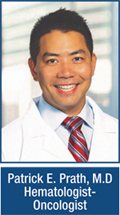 Houston Methodist Cancer Center at Sugar Land is pleased to welcome two new physicians to its medical staff.
Houston Methodist Cancer Center at Sugar Land is pleased to welcome two new physicians to its medical staff.
Hematology-Oncology
Patrick E. Prath, MD, fellowship-trained hematologist-oncologist, recently joined the doctors and staff of Houston Methodist Oncology Partners at Sugar Land.
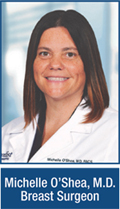 Their integrated, team approach addresses each patient’s unique needs, delivering individualized therapies, innovative research and clinical trials, all backed by the advanced technology of Houston Methodist Sugar Land. They are dedicated to providing comprehensive, world-class cancer care, close to home. To schedule an appointment with Dr. Prath, call 281.201.6669.
Their integrated, team approach addresses each patient’s unique needs, delivering individualized therapies, innovative research and clinical trials, all backed by the advanced technology of Houston Methodist Sugar Land. They are dedicated to providing comprehensive, world-class cancer care, close to home. To schedule an appointment with Dr. Prath, call 281.201.6669.
Breast Surgery
Dr. Michelle O’Shea, board-certified breast surgeon with over 20 years of experience, specializes in the treatment of both benign and malignant breast diseases.
The physicians at Houston Methodist Breast Surgery Partners in Sugar Land are dedicated to using the most innovative surgical techniques to create a fully individualized treatment plan for each patient. They bring a strong background in the diagnosis and treatment of breast diseases as well as a compassionate approach to patient care. To schedule an appointment with Dr. O’Shea, call 281.724.4276.



 <
<






 Another study by the IQVIA Institute in April found similar results: since February, colonoscopies were down 90 percent; Pap smears, down 83 percent; PSA testing, used to detect prostate cancer, down 60 percent; and CT scans for lung cancer, down 39 percent.
Another study by the IQVIA Institute in April found similar results: since February, colonoscopies were down 90 percent; Pap smears, down 83 percent; PSA testing, used to detect prostate cancer, down 60 percent; and CT scans for lung cancer, down 39 percent. Screening guidelines are based on years of data and are designed to ensure that patients are checked regularly for the most common forms of cancer.
Screening guidelines are based on years of data and are designed to ensure that patients are checked regularly for the most common forms of cancer. “Your doctor will want to know about high risk factors, such as family or personal history of polyps, colorectal or uterine cancers, or a personal history of chronic inflammatory bowel disease,” said Kirtan Nautiyal, board-certified hematologist-oncologist at Houston Methodist Oncology Partners at Sugar Land.
“Your doctor will want to know about high risk factors, such as family or personal history of polyps, colorectal or uterine cancers, or a personal history of chronic inflammatory bowel disease,” said Kirtan Nautiyal, board-certified hematologist-oncologist at Houston Methodist Oncology Partners at Sugar Land.
 Houston Methodist Cancer Center at Sugar Land is pleased to welcome two new physicians to its medical staff.
Houston Methodist Cancer Center at Sugar Land is pleased to welcome two new physicians to its medical staff. Their integrated, team approach addresses each patient’s unique needs, delivering individualized therapies, innovative research and clinical trials, all backed by the advanced technology of Houston Methodist Sugar Land. They are dedicated to providing comprehensive, world-class cancer care, close to home. To schedule an appointment with Dr. Prath, call 281.201.6669.
Their integrated, team approach addresses each patient’s unique needs, delivering individualized therapies, innovative research and clinical trials, all backed by the advanced technology of Houston Methodist Sugar Land. They are dedicated to providing comprehensive, world-class cancer care, close to home. To schedule an appointment with Dr. Prath, call 281.201.6669.